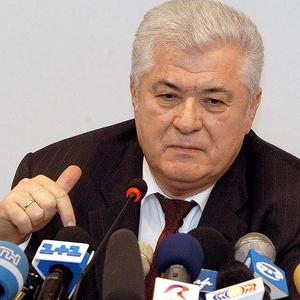
Ten Reasons Why the Communist Party Won Moldova’s Elections Again
Publication: Eurasia Daily Monitor Volume: 6 Issue: 66
By:

As anticipated (see EDM, March 13, 16) the Communist Party has won Moldova’s parliamentary elections on April 5, far outdistancing the parties that ran on anti-communist platforms. On paper at least–and every fourth year in real practice–Moldova is a parliamentary republic. The new parliament will approve the country’s government and elect a new president in place of the incumbent Vladimir Voronin, who has served out his second and final term of office.
The International Election Observation Mission–consisting of delegations from the OSCE Parliamentary Assembly, OSCE’s Office of Democratic Institutions and Human Rights (ODIHR), Council of Europe’s Parliamentary Assembly (PACE), and the European Parliament–evaluated the elections positively on the whole, with some reservations not affecting the outcome or the overall initial assessment. More detailed observations and recommendations for further improvements are to be presented in several months’ time (OSCE press release, April 6).
Within 24 hours of the polls’ closure and more than 98 percent of the votes counted, the Communists received 49.95 percent of the votes cast, the Liberal Party almost 13 percent, the Liberal-Democrat Party more than 12 percent, and Our Moldova Alliance (also claiming a liberal mantle), 10 percent. The voter turnout was 59.5 percent. The communist and liberal labels are merely nominal in these cases.
These four parties (out of a dozen parties competing in these elections) have passed the 6 percent threshold for entering the parliament. Thanks to redistribution of votes at the expense of losing parties under the proportional system, the Communists will hold 60 or 61 seats in the 101-seat parliament. The Liberals, Liberal-Democrats, and Our Moldova will most probably hold 15, 14, and 11 seats, respectively, according to the Central Electoral Commission’s announcement (Moldpres, April 6).
Uniquely in Europe and the post-Soviet world, Moldova’s Communists not only returned to power, but won it three consecutive times. Already in 1998 the party had won a plurality of 30 percent of the votes and 40 percent of parliamentary seats, but chose to remain in opposition at that time. The Communists proceeded to win 50.1 percent of the votes and 71 percent of parliamentary seats in 2001; 46 percent of the votes and 56 percent of the seats in 2005; and went on to improve on that performance in the 2009 elections.
Opposition parties had confidently expected to reverse that trend this time. Opinion surveys and many other indices from the field, however, presaged another Communist success, the only uncertainty being the victory margin. The margin is a critical factor, given the constitutional requirements to confirm the government by an absolute majority of parliamentary votes and elect the new head of state with the votes of at least 61 deputies. If that falls short, the parliament dissolves and new elections must be held. In this sense, the election’s outcome was uncertain all along; and may still hang in the balance with regard to the election of the head of state.
The Communist Party’s electoral performance rests on distinct local circumstances, often underappreciated by outsiders:
1) The Communist brand remains attractive to a critical mass of Moldovan voters. These compare (as do many Russian voters) the 1990s unfavorably both with the Soviet period and with the post-2001 period (when the Moldovan Communists returned to power).
2) The president and government used the incumbency advantage to the hilt, appearing in TV newscasts to open gas lines, agricultural machinery stations, and construction projects in the presence of appreciative voters during the electoral campaign. They also resorted to populist measures, from lowering the bread price to donating to charities during the campaign.
3) The incumbent government, predominantly of technical experts, is unquestionably Moldova’s most competent and convincing to voters since independence, contrasting with previous governments that were formed on a political basis. Prime Minister Zinaida Grecianai, one year in that post, enjoys a high popularity rating. The current government includes only two communist ministers, out of nineteen. Half of the ministers, however, ran for parliament on the Communist Party’s list, adding to the party’s "administrative resources" in this campaign.
4) The Communist Party is the only major party with a multi-ethnic electorate. Most opposition parties (including all three that have now entered the parliament) rely entirely on ethnic Moldovan voters (a minority of whom define themselves as Romanians) and have not seriously attempted to reach out to "Russian-speaking" voters. Many "Russian-speakers," who defected from the Europe-oriented Communist Party in recent years, crossed over to small pro-Moscow groups or declined to vote, rather than joining Moldovan opposition parties. The Communist Party was able to offset that loss by increasing its share of the ethnic Moldovan vote.
5)Exit polls, conducted by Western-funded NGOs, showed that the Communist Party made significant inroads into young age cohorts for the first time in these elections. As the poll coordinator, sociologist Arcadie Barbarosie (head of the Soros Foundation’s local affiliate) observes, the Communist Party can no longer be stereotyped as a "pensioners’" or Soviet-nostalgics’ party (Moldpres, Imedia, April 6).
6) Still communist, nevertheless, in its disciplined style of operating, the party has developed an effective style of door-to-door campaigning in towns and villages. Although it fully (if informally) controls public television, and less fully public radio, the party gave up some of its public airtime during the final phase of the campaign, reflecting its confidence in door-to-door activity.
7) The Communist Party ran a sophisticated campaign under the direction of presidential adviser Marc Tcaciuc, long reputed as the "grey eminence," and who has now earned the sobriquet of the party’s "grey matter" in this campaign (NewsIn, April 6). Apart from the public TV and radio company, the party controls two other television channels and one other country-wide radio channel.
8) While committed to European integration–a matter of national consensus above party lines–the Communist Party also advertised itself as Russia’s favored political partner in Moldova during this campaign. Voronin’s photo opportunity with Russian President Dmitry Medvedev in Moscow on March 18 (see EDM, March 20, 25) helped to prevent Moldova’s pro-Russia parties from gaining enough votes to enter the parliament. Voronin’s move also undoubtedly played well with mainstream Moldovan voters, among whom Medvedev and Russian President Vladimir Putin hold the top two places in the popularity ratings. Voronin a distant third overall, but is a distant first among domestic political figures.
9) The opposition-dominated Chisinau Municipal Council, a scene of chaos and nepotism, has played into the Communist Party’s hands. The party constantly compared that scene with the situation in the pre-2001 parliament, which had helped discredit the multi-party system in Moldova. Certain Liberal-Democrat and Our Moldova leaders are also associated in the public memory with that parliament, making it possible for the Communists to campaign once again against "the 1990s" in these elections.
10) Half a dozen parties with theoretical chances to pass the 6 percent threshold campaigned ineffectively, competing against each other as well as against the Communists. Anti-communist slogans proved once again ineffective and largely irrelevant in Moldova. Inasmuch as the Communist Party today is a far cry from its pre-1991 predecessor, mere anti-communism is yesteryear’s battle in Moldova. No fewer than four opposition parties advertised themselves as Liberal, in a country completely devoid of a bourgeoisie. Both programatically and organizationally, the opposition failed to present a credible alternative to the incumbent majority party.




